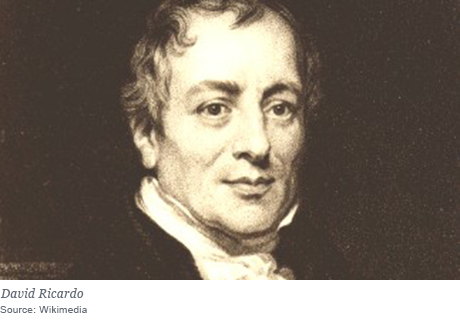You might think that, given the extreme levels of wealth that exist today, the richest economist would be someone who was still alive. But you’d be wrong.
Mark Skousen explains in a 2010 Daily Reckoning post how David Ricardo (1772-1823) became the richest economist in history (the post is excerpted from his 2009 book “The Making of Modern Economics: The Lives and Ideas of Great Thinkers”):
Ricardo has the distinction of writing erudite theoretical works and making a fortune. Few economists can boast doing both . . . Ricardo made his money primarily as a stockjobber, handling his own accounts, rather than as a broker. A stockjobber might be compared to a specialist on the floor of the New York Stock Exchange who handles large sums of stock and constantly makes a market in specific issues . . . A contemporary wrote of Ricardo: “He is said to have possessed an extraordinary quickness in perceiving in the turns of the market any accidental difference which might arise between the relative price of different stocks [government bonds].” His transactions would tend to be short-term and he would “realise a small percentage upon a large sum,” typically £200 to £300 a day. He wrote a friend, “I play for small stakes, and therefore if I’m a loser I have little to regret”.
When he died, his estate was worth more than $100 million, in today’s dollars. So why are there not so many super rich economists walking around? There may be a mistake in the assumption that Ricardo’s being an economist had everything or anything to do with his being a success in the market. (Maybe he would have gotten just as rich as a politician . . . wait a sec, he was a politician toward the end of this life.) The assumption of a cause and effect relationship in Ricardo’s case is further dashed when you consider that he started his career as a broker and speculator. First he got rich, and then he got interested in how it all works. One Investopedia post attempts to explain why economists aren’t rich by arguing that their profession deals with theoretical rather than practical studies and that, even though they can make large amounts of money as quants, that only works if the market does not stray from their model.
In the introduction to Exploring Economics (5th ed., 2008) Robert Sexton offers a similar explanation:
If becoming wealthy is your goal in studying economics, you may be disappointed. Although most economists make a good living, few have become rich from their knowledge of economics. In fact, if economists had some secret for making money in, for example, the stock market, they would likely be using those secrets to their own financial advantage . . . In short, economics won’t necessarily make you richer, but it may keep you from making some decisions that would make you poorer.
Ricardo isn’t famous because he was rich; he’s famous for some important economic theories: the theory of comparative advantage (1 minute cute video), and the theory of rent (13 minute serious video).
There are a few blog discussions of other rich economists: the Climateer Investing blog has a 2011 post about Paul Samuelson and hedge funds. Investopedia talks about John Maynard Keynes, the second richest economist.
You can read several editions of Ricardo’s famous treatise On the Principles of Political Economy and Taxation on the web (here’s the 1st ed., 1817, published by John Murray, and the 3rd ed., 1821. You can also read his Plan for the Establishment of a National Bank, published in 1824, after his death.
Disclaimer
The views expressed in this post are those of the author and do not necessarily reflect the position of the Federal Reserve Bank of New York or the Federal Reserve System. Any errors or omissions are the responsibility of the author.
Amy Farber is a research librarian in the Federal Reserve Bank of New York’s Research and Statistics Group.












 RSS Feed
RSS Feed Follow Liberty Street Economics
Follow Liberty Street Economics
My bet is that Paul Samuelson is the richest economist. I have from a very reliable source that he was a “large” investor in Berkshire Hathaway. A 1,000 A shares at current price are worth $200,000,000; 10,000 shares $2billion.
It might be worth your time to examine current or recent academic economists with sidelines in consulting and finance. Start with Teece of Berkeley, LECG, BEG and Bay area real estate. See also Lakonishok, Shleifer, and Vishny currently or formerly of of LSV Asset Management. Sandy Grossman was President of QFS Asset Management. There are others.
A couple of other very rich economists are Irving Fisher, who invented the Rolodex, and Otto Eckstein, who founded the economic forecasting company DRI, which sold, I believe, for $100 million.